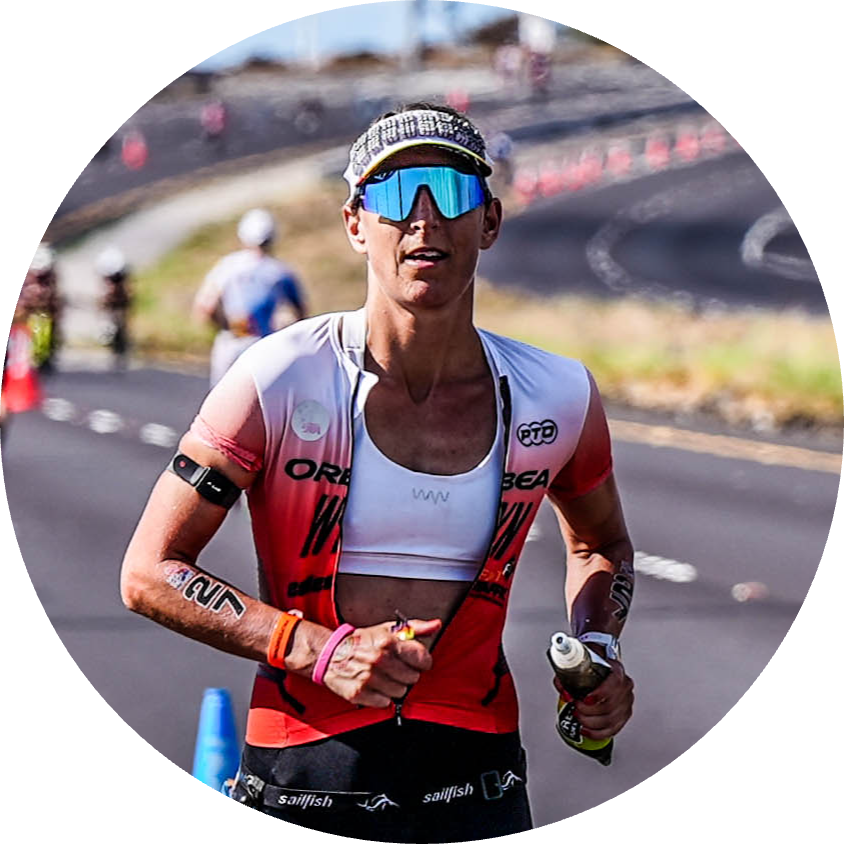
Rebecca Clarke
IRONMAN® World Championships
Rebecca's headline numbers
Rebecca's strategy
Fueling
Carbohydrate is the main fuel you burn when racing. Failing to fuel properly is a leading cause of underperformance in longer races.
Having worked closely with Rebecca in the lead up to Kona 2023, it was great to see her improve upon the carb intake she achieved at both the IRONMAN European Championships (~69g/h) and IRONMAN New Zealand (~81g/h), which helped her improve on her 2022 Kona time by 20 minutes. Despite a consistent fueling strategy to achieve these numbers, Rebecca felt ‘waves’ of energy while out on the run course. This could be attributed to a combination of accumulated muscular fatigue, the topography of the course and the fluctuations in supportive crowd density that Rebecca experienced during the run.
Hydration
Taking on board an appropriate amount of fluid and sodium is essential to maintaining blood volume and supporting the cardiovascular effort needed to perform on race day.
Whilst the absolute amount of sodium and fluid consumed per hour is important, it’s critical to consider these in relation to each other. This is known as 'relative sodium concentration' and it’s expressed in milligrams per litre (mg/L). How much sodium you’re taking in per litre of fluid is more important than the absolute amount taken in per hour.
Sweat sodium concentration (mg/L) is largely genetically determined and remains relatively stable. Knowing how salty your sweat is enables you to replace a good proportion of your sweat losses, which can range from 200-2,000mg/L.
Whilst Rebecca’s losses are on the low side, getting her hydration strategy right is still crucial when it’s hot and/or humid as her higher sweat rate in these conditions can result in significant net losses over the duration of a race.
Learn moreLosing a significant part of your hydration strategy within the first five minutes is not the ideal start to anyone's IM World Championships bike leg. Fortunately, Rebecca had enough information about her personal sweat losses, having undergone a Sweat Test and conducted sweat rate testing. This allowed her to adapt her strategy on the fly during the race, ensuring she consumed an appropriate volume of fluids from aid station pickups while maintaining a proper sodium balance. Despite the heat and humidity making Rebecca's sweat rate higher than when training back home in New Zealand, she was still able to drink enough to match her losses when looking at the high level numbers.
Caffeine
Beyond the Three Levers of Performance (carb, sodium and fluid), caffeine is one of only a few substances that is proven to improve performance for most endurance athletes as it can help stave off mental and physical fatigue.
Rebecca managed her caffeine intake effectively for this race, surpassing the recommended guidelines slightly to optimise the potential for ergogenic benefits. Notably, Rebecca has previously consumed significantly higher caffeine doses at her past races without experiencing any adverse effects, suggesting that slightly exceeding typical limits doesn't affect her specifically in the detrimental way that it might for others.
How Rebecca hit her numbers
Here's everything that Rebecca ate and drank on the day...
Rebecca's weapons of choice
Final thoughts
Rebecca's full stats
Data Confidence?
There is some confidence in the quantities and brands of products consumed but the data may lack specifics (e.g. volumes specific flavours). A high number of estimations have been made and the room for error is moderate-high. There may also be the possibility that some intake has been grossly over- or under-estimated.